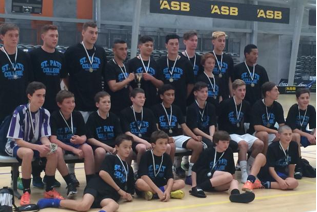 Matt Fejos has shown the pathway of moving up through the College Sport system as a coach in futsal. This same pathway and training ground of college sport applies to players, many who have gone onto to bigger things overseas. After taking Wellington High School to the first Futsal College Nationals in 2011, he went on to build St Pats Town into the most successful futsal school in the country. They won the senior championship for the second time in a row last year and are now seeking a historic ‘threepeat’ at the 2016 edition on April 7 & 8 at the ASB Sports Centre. Matt now lives in Manchester where he is undertaking his coaching qualifications with The FA, and working as a futsal coach for an academy that regularly sees young players go on to pro football academies at the likes of Liverpool, Manchester City and Manchester United. Here he gives his thoughts on what he looks for in young players and why. 5. Commitment. This is a cliché, but without some effort and sacrifice nothing will happen. I believe everything happens with a decision to try first, and that talent can’t realise potential until it works hard. What’s important is that the commitment is to the greater good of the team and the team goals, rather than any individual goals. At St Pats, we lived and died as a team so focus on individual roles within that, in order to help the team achieve our goals. 4. Role Models. Life is bigger than sport, and these young men are more than just futsal players. There is a genuine desire and purpose within them to represent the school with pride to the wider community. They’re not just playing futsal, they’re representing their entire school community. That is a big responsibility which they take on and generally do great justice. We’re trying to build better people through futsal. Futsal in the training ground for life. 3. Perseverance. This is one of the biggest ones for me, and it’s another skill we can learn from sport to take into life. It’s easy to commit when things are going well, but preserving is when things are tough. We have a great pride in our ability to perform under pressure, when things are tough, and we are behind on the score board. In the national title last year, the team was never in a winning position in the semi or final. They had to come from behind and taking things like penalties to claim glory. Every team will be in a losing situation at some point. Being comfortable in uncomfortable situations is a necessity. This quality can easily be observed in training situations, and can equally be worked on by players. If you’re not making recovery runs because you can’t be bothered, a good coach will notice. 2. Effect on others. This is another cliché of being a team player, but it’s something I believe in a lot. We can measure a player by his or her contributions to the team, making passes, runs off the ball etc. But there is also an intangible that comes through people that get the best of those around them. Players like Steven Gerard at Liverpool who lift the belief and thus performance in those around him. We’ve been lucky enough to have Clayton Lewis; his skill, vision and work-rate was exemplary. But he also put his arm around younger players and supported them. These little moments can build momentum swings in matches that can prove decisive. He went from College Futsal with St Pats to making his full All Whites debut in 12 months. 1. Decision Makers. I am a coach, but not a dictator. I don’t like to dictate every situation – to pass here or run there. I want players that are aware, and understand the underlying principles we are trying to learn. And I will guide them through this with my style of coaching. I want players that show a genuine interest in learning, players that ask lots of questions. My measure of success or effectiveness as a coach is if I walked away, or if I watched from the stands, and the players still know what to do. In fact, I did this once in a national tournament with a Capital team. I wasn’t happy with the standards in the warm-up, so I left them to it and said it wasn’t good enough. I watched from afar and let them start the game and organise themselves. Funnily enough they stepped up. If you’re a young player, be aware that an assessment of your contribution to the team isn’t just limited strictly to your skills. Coaches will look at the whole picture. How driven you are, how you interact with your team mates, what you do when you are down and your ability to learn general underlying concepts. Don’t forget to work on these bigger qualities that will also help you in life, as we enter trial season and form new teams for the 2016 college sport year ahead. Check out Matt’s blog, where he writes about futsal, psychology and life in Manchester. |
CategoriesArchives
March 2023
|
OrganisationCollege Sport Media is dedicated to telling the story of successful young sportspeople in New Zealand
|

 RSS Feed
RSS Feed